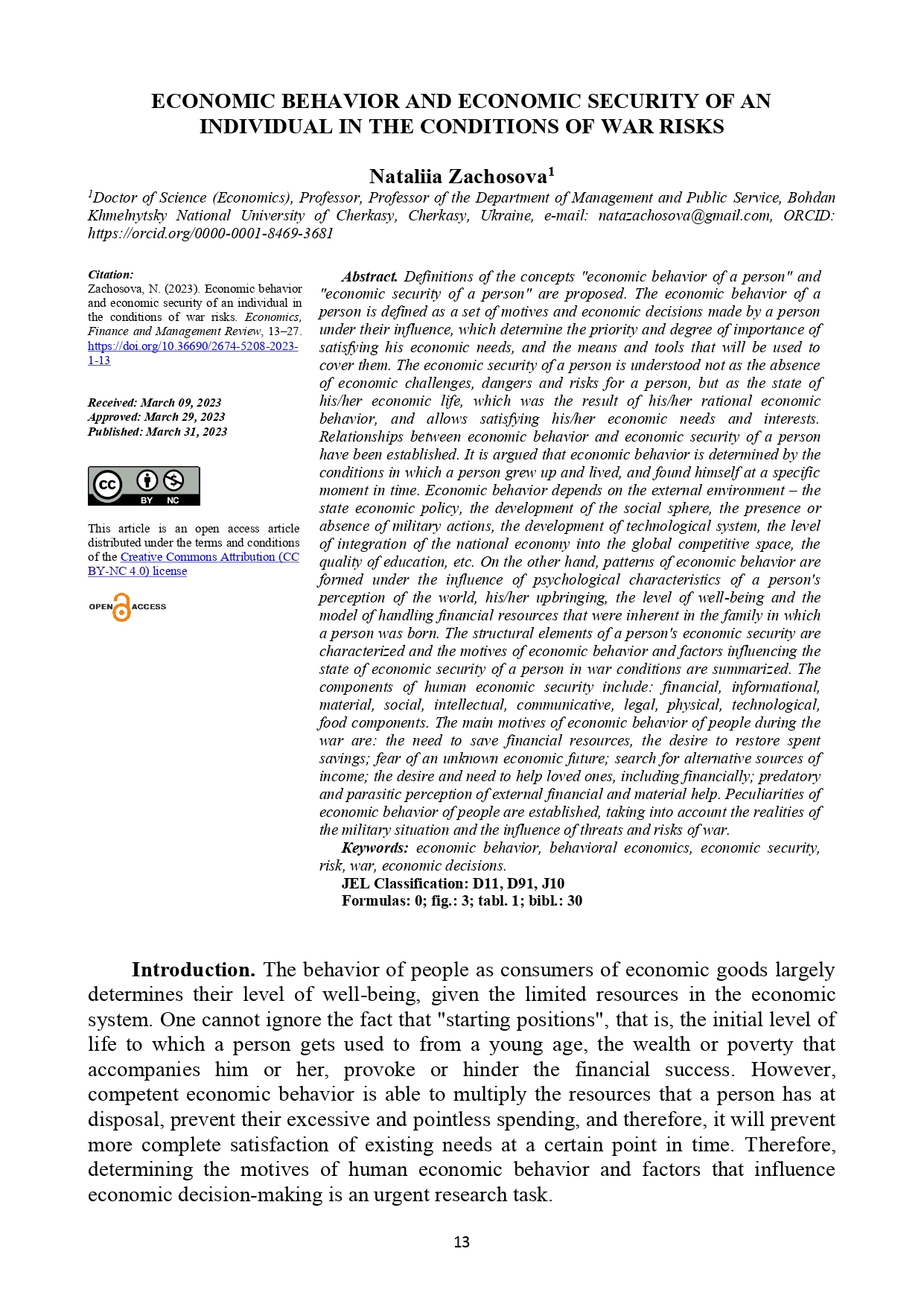ECONOMIC BEHAVIOR AND ECONOMIC SECURITY OF AN INDIVIDUAL IN THE CONDITIONS OF WAR RISKS
DOI:
https://doi.org/10.36690/2674-5208-2023-1-13Keywords:
economic behavior, behavioral economics, economic security, risk, war, economic decisionsAbstract
Definitions of the concepts "economic behavior of a person" and "economic security of a person" are proposed. The economic behavior of a person is defined as a set of motives and economic decisions made by a person under their influence, which determine the priority and degree of importance of satisfying his economic needs, and the means and tools that will be used to cover them. The economic security of a person is understood not as the absence of economic challenges, dangers and risks for a person, but as the state of his/her economic life, which was the result of his/her rational economic behavior, and allows satisfying his/her economic needs and interests. Relationships between economic behavior and economic security of a person have been established. It is argued that economic behavior is determined by the conditions in which a person grew up and lived, and found himself at a specific moment in time. Economic behavior depends on the external environment ‒ the state economic policy, the development of the social sphere, the presence or absence of military actions, the development of technological system, the level of integration of the national economy into the global competitive space, the quality of education, etc. On the other hand, patterns of economic behavior are formed under the influence of psychological characteristics of a person's perception of the world, his/her upbringing, the level of well-being and the model of handling financial resources that were inherent in the family in which a person was born. The structural elements of a person's economic security are characterized and the motives of economic behavior and factors influencing the state of economic security of a person in war conditions are summarized. The components of human economic security include: financial, informational, material, social, intellectual, communicative, legal, physical, technological, food components. The main motives of economic behavior of people during the war are: the need to save financial resources, the desire to restore spent savings; fear of an unknown economic future; search for alternative sources of income; the desire and need to help loved ones, including financially; predatory and parasitic perception of external financial and material help. Peculiarities of economic behavior of people are established, taking into account the realities of the military situation and the influence of threats and risks of war.
Downloads
References
Thaler, R. H. (2016). Behavioral Economics: Past, Present, and Future. American Economic Review, 106 (7), 1577-1600, https://doi.org/10.1257/aer.106.7.1577.
Simon, H. (1992). What is an «Explanation» of Behavior? Psychological Science, 3(3), 150-161.
Kahneman, D., & Tversky, A. (2000). Choices, values, and frames. Cambridge University Press.
Kahneman, D. (2013). Thinking Fast and Slow. New York, NY: Farrar, Straus, and Giroux. 10, 48, 119, 242–244, 271, 282–286, 289–299, 415–417.
Goodwin, N., Harris, J. M., Nelson, J. A., Rajkarnikar, P. J., Roa, B., & Torras, M. (2019). Chapter 7: economic behavior and rationality. Microeconomics in Context. Routledge. 207-227. Retrieved January 9, 2023, from: https://www.bu.edu/eci/files/2019/05/MIC_4e_Ch7.pdf, https://doi.org/10.4324/9781003252207.
Angner, E., & Loewenstein, G. (2006). Behavioral economics. Handbook of the Philosophy of Science, 5, 78.
Jackson, M. O. (2009). Networks and Economic Behavior. Annual Review of Economics, 1(1), 489-513, https://doi.org/10.1146/annurev.economics.050708.143238.
Sekścińska, K., Maison, D. A., & Trzcińska, A. (2016). How people's motivational system and situational motivation influence their risky financial choices. Frontiers in Psychology, 7, 1360.
Corr, P. & Plagnol, A. (2019). Behavioral Economics: The Basics. London and New York: Routledge, 250.
Sutter, M., Zoller, C., & Glätzle-Rützler, D. (2018). Economic Behavior of Children and Adolescents - A First Survey of Experimental Economics Results. 47. Retrieved February 19, 2023, from: https://docs.iza.org/dp11947.pdf.
Ivanova, N.S. (2020). Ekonomichna bezpeka [Economic security]. Kryvyi Rih: DonNUET, 139.
What is Economic Security? (n.d.). Retrieved February 19, 2023, from: https://www.icrc.org/en/document/introduction-economic-security.
Economic Security (n.d.). Retrieved March 12, 2023, from: https://gsdi.unc.edu/our-work/economic-security/.
Edwards, K. A. & Murphy, G. (2022). Addressing Economic Insecurity in the U.S. Retrieved March 10, 2023, from: https://www.nasi.org/research/economic-security/the-four-pillars-of-economic-security/.
Hacker, J. S. (n.d.). Chapter 8. Economic security. Retrieved March 10, 2023, from: https://www.oecd-ilibrary.org/sites/9789264307278-10-en/index.html?itemId=/content/component/9789264307278-10-en.
Balanyuk, I.F., & Maksymyuk, M.M. (2016). Vydy ekonomichnoyi bezpeky [Types of economic security]. Naukovyy visnyk Uzhhorodsʹkoho universytetu. Seriya Ekonomika, 1(47), 2, 142-145.
Better Life Index (2022). Retrieved February 20, 2023, from: https://stats.oecd.org/Index.aspx?DataSetCode=BLI.
Quality of Life Index by Country 2023. Retrieved February 21, 2023, from: https://www.numbeo.com/quality-of-life/rankings_by_country.jsp
Food Prices in Ukraine (n.d.). Retrieved February 1, 2023, from: https://www.numbeo.com/food-prices/country_result.jsp?country=Ukraine
World Happiness Report (n.d.). Retrieved February 12, 2023, from: https://worldhappiness.report.
Voznyy, K.Z. (2009). Ekonomichna povedinka lyudyny ta yiyi mentalni motyvy [Economic behavior of a person and his mental motives]. Aktualnii problemy ekonomiiky, 5((95)), 3-15.
Bazetska, H. I. (2021). Ekonomichna povedinka v umovakh nevyznachenosti [Economic behavior under uncertaintyhud]. Ekonomichna teoriia ta pravo, 4 (47), 53-68, https://doi.org/10.31359/2411-5584-2021-47-4-53.
Turner, T. (2023). Wealth Management Retrieved February 12, 2023, from: https://www.annuity.org/personal-finance/wealth-management/.
Lusardi, A. (2019). Financial literacy and the need for financial education: evidence and implications. Swiss J Economics Statistics, 155, 1, https://doi.org/10.1186/s41937-019-0027-5.
Klapper, L., Lusardi, A., & Van Oudheusden, P. (2015). Financial literacy around the world. In Standard & Poor’s Ratings Services Global Financial Literacy Survey (GFLEC working paper).
Urban, C., Schmeiser, M., Collins, J. M., & Brown, A. (2018). The effects of high school personal financial education policies on financial behavior. Economics of Education Review. Retrieved February 14, 2023, from: https://www.sciencedirect.com/science/article/abs/pii/S0272775718301699.
Sharkey, S. (n.d.). Financial Literacy. Review. Retrieved February 14, 2023, from: https://lincs.ed.gov/sites/default/files/TSTMFinancLiterBrief-508.pdf.
Retrieved February 28, 2023, from: https://gflec.org/initiatives/personal-finance-index/
Finansova hramotnist, finansova inklyuziya ta finansovyy dobrobut v Ukrayini u 2021 [Financial literacy, financial inclusion and financial well-being in Ukraine in 2021] (2021). Retrieved February 11, 2023, from: https://bank.gov.ua/admin_uploads/article/Research_Financial_Literacy_Inclusion_Welfare_2021.pdf.
Lack of financial literacy cost 15% of adults at least $10,000 in 2022. Here’s how the rest fared (2023). Retrieved February 11, 2023, from: https://www.cnbc.com/2023/01/19/heres-how-much-people-say-lack-of-financial-literacy-cost-in-2022.html.

Downloads
Published
How to Cite
Issue
Section
License

This work is licensed under a Creative Commons Attribution-NonCommercial 4.0 International License.








